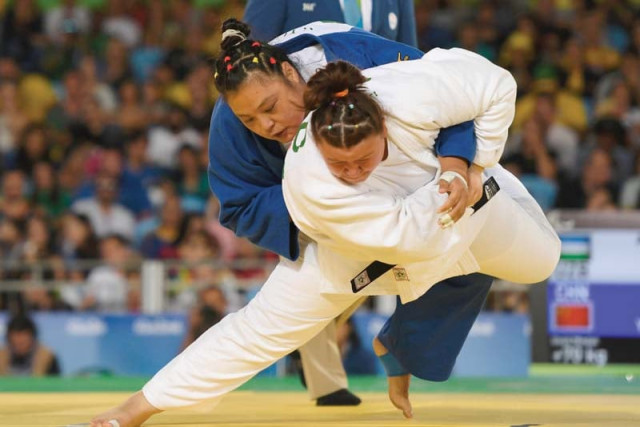No sight, no problem: Hands can hit what eyes can’t see
Paralympic judokas are an aberration to great Mohammad Ali's saying

Judokas participating in 2016 Paralympics don’t let their disabilities stand in their way and compete just as hard as their able-bodied counterparts do. PHOTO: AFP
"It makes perfect sense," Garcia told AFP right after defeating Brazil's Deanne Almeida for bronze in the over 70kg category in Rio de Janeiro on Saturday.
Garcia, who has been almost completely blind from birth, said that out on the judo mat, where opponents try to outwit, unbalance and throw each other, her disability no longer matters.
Egypt’s Hamadtou sinks teeth into table tennis
"You're gripping and you feel your opponent's body and the way they're moving," said Garcia, 37. "It's about who wants it the most."
Judo in the Paralympics is reserved for the visually impaired — some with limited eyesight, others like Garcia with virtually none. But there are surprisingly few changes to the way the regular sport is played.
Contestants unable to see the boundaries may unwittingly spill outside, so the referee has to guide them back. And unlike in regular judo, where the clock is visible, a loud buzzer goes off at the one minute warning before the bout ends.
Otherwise, the combatants in their white or blue kimonos fight as skillfully and fiercely as those with proper vision. It can be easy to forget they are blind at all — until the incongruously gentle scene of a referee leading a black belt fighter around by the hand.
This Paralympic swimming star doesn’t want to be called Phelps
Another US bronze medal winner on Saturday, Dartanyon Crockett, only took up judo when he left high school.
Learning a sport in which being propelled through the air or choked while lying on the mat are integral parts was not easy for a young man born blind.
"Part of doing judo for the visually impaired is putting yourself in a scary, uncomfortable situation," said Crockett, now 25. "It's about stepping out of your comfort zone."
Published in The Express Tribune, September 12th, 2016.
Like Sports on Facebook, follow @ETribuneSports on Twitter to stay informed and join in the conversation.



















COMMENTS
Comments are moderated and generally will be posted if they are on-topic and not abusive.
For more information, please see our Comments FAQ